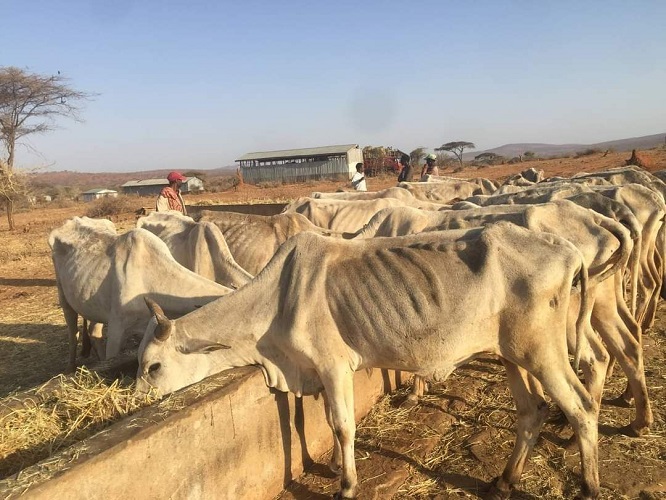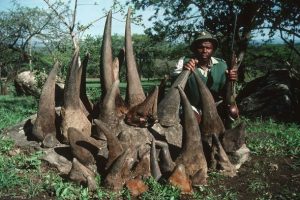
BY EPHREM ANDARGACHEW
Climate change that occurs across the globe causes an increase in global temperature, and sea level, and fossil fuel consumption. Developing countries, unlike industrially advanced and developed nations, have been affected and faced global climate change risks which increases from time to time.
Especially, the Horn of Africa has faced recurrent droughts. Currently, the drought-affected places in East Africa have been requiring urgent government and concerned bodies’ intervention to provide humanitarian assistance and fodders. The region has experienced consecutive failed rainy seasons which experienced serious impacts of prolonged drought, and one of the driest periods.
According to the United Nations Office for the Coordination of Humanitarian Affairs (UNOCHA) report, “across the region, at least 36.1 million people have been affected by the drought including 24.1 million in Ethiopia, 7.8 million in Somalia, and 4.2 million in Kenya. As a minimum, 20.5 million people have faced serious high levels of acute food insecurity and this figure could increase to between 23 and 26 million by February 2023.”
This year, the numbers are increased and the drought is affecting the entire horn of Africa severely. In Ethiopia, drought has affected livestock production and the livelihoods of the pastoralists resulting in heavy economic loss. Although many areas of Ethiopian pastoralists have been affected by the negative impact of drought, Borana pastoralists are affected seriously and the impact is worse than before.
The Borena is a zone found in the Oromia regional states of Ethiopia. The Zone is bordered on the south by Kenya, on the west by the Southern Nations, Nationalities, and Peoples Region, on the north by West Guji, and the east by Dawa Zone of Somali Region.
The Borana are nomadic pastoralists who herded livestock including cattle, goats, and sheep. They lived in semi-arid areas. They also practiced small-scale farming on fertile lands in the higher regions around Moyale, and in the river basins in Isiolo county.
However, the Zone dryland areas have experienced recurrent drought impacts every year, but the current drought is very severe and long. Lack of rain for three years increased the earth’s surface temperature and dryness, which resulted in a critical shortage of pasture and water that lead to the emaciation of livestock and massive deaths of livestock particularly cattle, which is the main livelihood asset of the community.
The drought affected not only the productivity of the livestock but also the production of agro-pastoralist communities that practice farming besides livestock breeding. Hence, these three years have been years of suffering for Borana Zone pastoralists.
Taking the severity and range of the drought into account, the Borana Zone administration made a call for more support since the support provided to the victims in the zone is not enough.
Oromia Region Borena Zone Administrator Jarso Boru said that the drought that occurred in the zone is causing great damage to people and animals. Accordingly, 807 thousand of people need help due to the drought in the zone.
Furthermore, currently, more than 3.3 million animals have died in the drought, and the aid is not enough for the victims. Due to the lack of rain in the last 3 years, more than 800,000 people have been exposed to severe problems.
However, Before the drought, the zone received rain twice a year, he recalled. But the region hasn’t received rain for five consecutive rounds in the last three years. Hence, the drought has affected 13 districts in the zone, as a result, 60 percent of the society in the zone needs urgent support, he explained.
Apart from informing the regional and federal governments about the severity of the drought, the Zone, despite the seriousness of the problem, has been doing various life-saving work. Accordingly, the government has provided more than 90,600 quintals of wheat, 2,66 liters of oil, and 22 water bottles to more than 600,000 people in just one round.
Non-governmental organizations and development partners have provided around 750 million birr worth of aid to people affected by the drought. However, the aid and the support of current assistance are not enough for the people.
The zone is giving priority to withstanding the negative impact of the drought and saving the lives of the people and has not done rehabilitation work since the drought has not stopped and affects the life of the people, he elaborated.
In the Zone, long-term and short-term plans are implemented to solve the problem of drought. Particularly, the Oromia Regional Government, since the people living in Zone are pastoralists, is building 18 small dams that can retain rainwater to alleviate the water shortage of the local community. The Zone is also working to utilize the groundwater.
Indeed, the absence of rain in one season would affect the farmers. It also forces them to lead a risky life. Climatic change and other human-induced factors including drought and desertification add fuel to the existing problems in Ethiopia.
Based on the country’s experiences, drought has been affecting nearly all sectors in Ethiopia namely agriculture, water resources, the availability of freshwater, inadequate water for industry, reduced electricity production from hydropower, fishery, and so on.
Climate change negatively affects the ecosystems and causes loss of wetlands and lakes, loss of forest and soil cover, increased soil erosion, and land degradation. It is also a source of socio-economic problems like increasing human and livestock diseases, migration, conflict over water, and the decline in the National Gross Domestic Product (GDP).
Due to the aforementioned and related problems, in Borena, drought negatively affects the lives of humans, animals, and biodiversity. This requires an urgent and collaborative response from the government, individuals, Regional states, City Administration, and stakeholders to provide humanitarian assistance in accordance with their capacity.
The government should also put a direction to provide support for drought-affected areas of the Borena people. Because the complexity of the problems in the zone and the inadequate support from partners created a negative impact on the support and response endeavors.
In actual fact, it is essential to support each other instead of expecting donors and other partners. Expecting and depending on others has no result or the result could be a very short time. Hence, local donors and solutions are key to withstand drought-related effects and other man-made difficulties in the Zone. Besides, efforts should be made to prevent the drought not turning into a famine.
Sharing pain and supporting each other during difficulties is a long ingrained culture of the people. Recognizing the problem of others is essential to minimize, if possible to alleviate, the problem since the damage has been done across the Zone.
The efforts that have been done by some people, individuals, and the regional government is important to the zone. Especially, the action that was taken by the Gedeo Zone last year, which received drought-affected Borena Zone cattle and grazes them on their grazing land, should continue this year to pass this drought season.
However, extensive efforts and plans for short and long-term activities are still needed from the government, the concerned bodies, stakeholders, partners, and so on to prevent the drought from turning into a famine. the devastating consequences of the recent prolonged drought on Borana pastoralists could be alleviated through the collaboration of the people.
The Ethiopian Herald 26 February 2023




